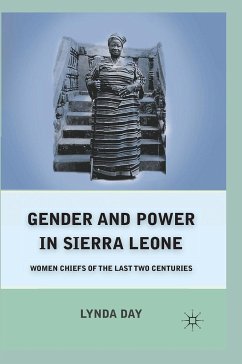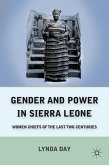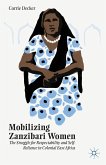'Using interviews, observation, archival sources, and photos, Day carefully constructs an historical study of female chieftaincies in the southern and eastern provinces of Sierra Leone. Strong ethnographic and historical background sets the stage for understanding the resilience of women paramount chiefs in Mende society. Excellent case studies of individual women paramount chiefs appear throughout. Recommended.' - CHOICE
'Professor Day has demonstrated convincingly in this book that far from being political aberrations or colonial creations, female chiefs in Sierra Leone have many historical antecedents and that they emerged from indigenous principles embedded in lineage dynamics, cultural associations, and gendered roles. The lives, challenges, and triumphs of prominent female leaders in colonial and postcolonial Sierra Leone are recounted eloquently and critically but also with empathy and sensitivity to local cultural nuances. The work offers a refreshingly female- and African-centered perspective of understanding power and authority in an African setting. This illuminating and richly textured interdisciplinary analysis of an alternate model of power and authority in West Africa should interest students and scholars of African History, Feminism, and Cultural Anthropology.' Ismail Rashid, associate professor of History, Vassar College
'Lynda Day's engagingly written, provocative work combines sharp analysis of the fluidity of constructed gender witha solidly grounded historical account of the gendered strategies of Mende women chiefs from the pre-colonial period through the civil war and post-war reconstruction. Day reclaims the literature celebrating African queens and transforms it into a subtle analysis of gendered political and social power, revealing the 'traditional' authority of women chiefs not as a fixed form no longer appropriate for contemporary gender politics, but as a mode of political leadership that can be adapted to changing historical circumstances and opportunities, potentially creating new forms of complementary not oppositional gendered political authority.' Judith Van Allen, research fellow, Institute for African Development, Cornell University
'Professor Day has demonstrated convincingly in this book that far from being political aberrations or colonial creations, female chiefs in Sierra Leone have many historical antecedents and that they emerged from indigenous principles embedded in lineage dynamics, cultural associations, and gendered roles. The lives, challenges, and triumphs of prominent female leaders in colonial and postcolonial Sierra Leone are recounted eloquently and critically but also with empathy and sensitivity to local cultural nuances. The work offers a refreshingly female- and African-centered perspective of understanding power and authority in an African setting. This illuminating and richly textured interdisciplinary analysis of an alternate model of power and authority in West Africa should interest students and scholars of African History, Feminism, and Cultural Anthropology.' Ismail Rashid, associate professor of History, Vassar College
'Lynda Day's engagingly written, provocative work combines sharp analysis of the fluidity of constructed gender witha solidly grounded historical account of the gendered strategies of Mende women chiefs from the pre-colonial period through the civil war and post-war reconstruction. Day reclaims the literature celebrating African queens and transforms it into a subtle analysis of gendered political and social power, revealing the 'traditional' authority of women chiefs not as a fixed form no longer appropriate for contemporary gender politics, but as a mode of political leadership that can be adapted to changing historical circumstances and opportunities, potentially creating new forms of complementary not oppositional gendered political authority.' Judith Van Allen, research fellow, Institute for African Development, Cornell University









